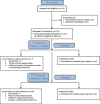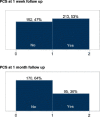Who gets post-concussion syndrome? An emergency department-based prospective analysis
- PMID: 25635191
- PMCID: PMC4306054
- DOI: 10.1186/s12245-014-0031-6
Who gets post-concussion syndrome? An emergency department-based prospective analysis
Abstract
Background: The objective of this study was to determine who gets post-concussion syndrome (PCS) after mild traumatic brain injury or head injury.
Methods: Patients presented within an hour of mild traumatic brain injury (mTBI). Written informed consent was obtained from all patients, who then provided detailed answers to surveys at the time of injury as well as at 1 week and 1 month follow-up. Statistical analyses were performed using JMP 11.0 for the Macintosh.
Results: The most commonly reported symptoms of PCS at first follow-up were headache (27%), trouble falling asleep (18%), fatigue (17%), difficulty remembering (16%), and dizziness (16%). Furthermore, only 61% of the cohort was driving at 1 week follow-up, compared to 100% prior to the injury. Linear regression analysis revealed the consumption of alcohol prior to head injury, the mechanism of head injury being a result of motor vehicle collision (MVC) or fall, and the presence of a post-injury headache to be significantly associated with developing PCS at 1 week follow-up, while the occurrence of a seizure post-injury or having an alteration in consciousness post-injury was significantly associated with developing PCS at 1 month follow-up. On multivariate regression analysis, the presence of a headache post-injury was the most robust predictor, retaining statistical significance even after controlling for age, gender, and presence of loss of consciousness (LOC), alteration of consciousness (AOC), post-traumatic amnesia (PTA), seizure, or vomiting.
Conclusions: The results of this prospective study suggest that headache right after the head injury, an alteration of consciousness after the head injury, and alcohol consumption prior to the head injury are significant predictors of developing PCS, which occurs with equal frequency in men and women. Early identification of those who are at risk of developing PCS would diminish the burden of the injury and could potentially reduce the number of missed work and school days.
Keywords: Emergency department; Mild traumatic brain injury; Post-concussion syndrome.
Figures
References
-
- http://www.cdc.gov/traumaticbraininjury/seniors.html Help seniors live better, longer: prevent brain injury. []
-
- http://www.cdc.gov/concussion/headsup/pdf/facts_for_Physicians_booklet-a... Heads up. Facts for physicians about mild traumatic brain injury (MTBI). []
LinkOut - more resources
Full Text Sources
Other Literature Sources



